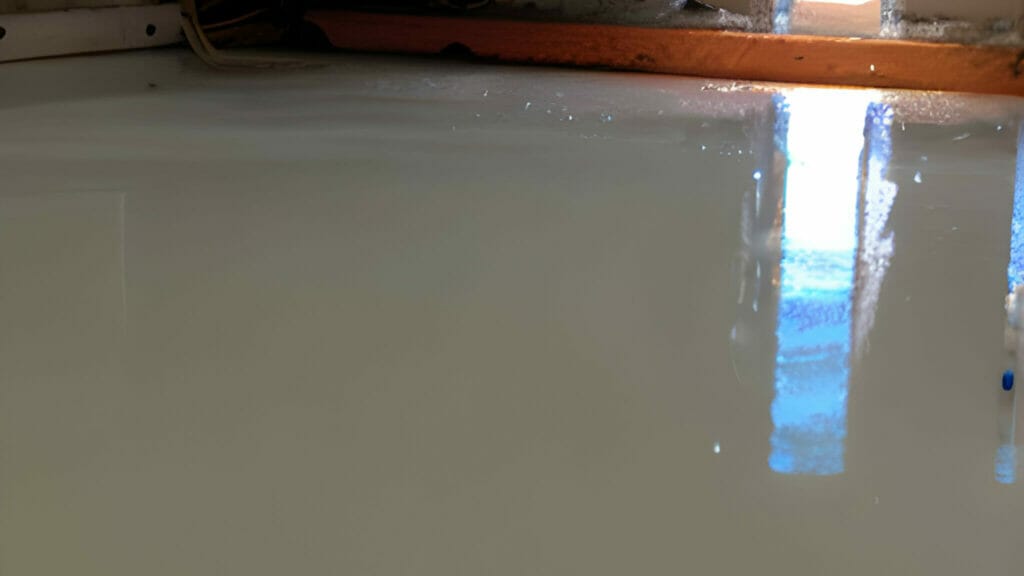Epoxy resin is a versatile and durable material often used in construction and DIY projects. It is a type of synthetic polymer that hardens and bonds when mixed with a curing agent, resulting in a strong and glossy finish. In recent years, epoxy resin has gained popularity as a material for countertops due to its unique properties and aesthetic appeal.
Using epoxy resin for countertops involves pouring the liquid mixture onto a flat surface and allowing it to cure into a hard, durable, and glossy finish. This process can be used on a variety of surfaces, such as wood, concrete, and even existing countertops.
Some benefits of using epoxy resin for countertops include its durability, heat, and scratch resistance, and the ability to create a seamless, glossy finish. However, there are also some drawbacks, such as potential health hazards during the application process and the need for regular maintenance and care.
There are various types of epoxy resin available for countertops, each with its unique properties and uses. These include:
- self-leveling epoxy resin
- ultra-clear epoxy resin
- UV-resistant epoxy resin
- heat-resistant epoxy resin
Proper preparation and application are key to achieving a successful epoxy resin countertop. This involves surface preparation, mixing the resin and curing agent in the correct ratio, and applying multiple layers for a smooth finish. After curing, it is important to care for and maintain the countertops to ensure their longevity.
Epoxy resin countertops have a wide range of uses, including kitchen and bathroom countertops, bar tops, and tabletops. Due to its versatility and durability, it is a popular choice for both residential and commercial applications.
In conclusion, epoxy resin is a strong and versatile material that can be used to create beautiful and durable countertops. With proper preparation, application, and care, epoxy resin countertops can elevate the aesthetics and functionality of any space.
Key Takeaways:
- Epoxy resin is a versatile and durable material used for countertops due to its strength and resistance to heat, scratches, and stains.
- There are different types of epoxy resin for countertops, such as self-leveling, ultra-clear, UV-resistant, and heat-resistant, each with its unique properties and uses.
- Proper surface preparation, mixing ratio, and curing are crucial for achieving a smooth and long-lasting finish when using epoxy resin for countertops. Regular cleaning and maintenance can also extend their lifespan.
What Is Epoxy Resin?
Epoxy resin is a synthetic polymer that is produced through a chemical reaction, transforming a liquid into a solid. It is often utilized as a coating for different surfaces, including countertops, due to its strong and long-lasting characteristics. With its glossy and seamless finish, epoxy resin is a popular choice for both residential and commercial spaces. Its adaptability and ability to withstand moisture, heat, and chemicals make it a favored option for countertop use.
The discovery of epoxy resin can be traced back to the 1930s when chemist Dr. Pierre Castan was searching for a strong adhesive. While working on a project to create a new synthetic varnish, he accidentally stumbled upon its durable properties. This chance discovery led to the widespread use of epoxy resin in various industrial and household applications.
How Is Epoxy Resin Used for Countertops?
- Surface Preparation: Clean and degrease the countertop surface thoroughly.
- Mix Epoxy Resin: Follow the manufacturer’s instructions to mix the epoxy resin and hardener.
- Apply Epoxy Resin: Pour the mixed epoxy resin onto the countertop surface and spread it evenly using a brush or roller.
- Remove Bubbles: Use a heat gun or a blow torch to eliminate any air bubbles from the resin.
- Curing: Allow the epoxy resin to cure for the recommended time for a durable countertop finish.
In the early 1930s, Dr. Pierre Castan of Switzerland developed the first epoxy resin. It was initially used as a dental adhesive before its applications expanded to various industries, including its use for countertops.
What Are the Benefits of Using Epoxy Resin for Countertops?
Epoxy resin offers numerous benefits for countertops, including:
- Durability: Epoxy resin countertops are highly resistant to scratches, heat, and impact damage.
- Aesthetic versatility: It allows for a wide range of design options, including color customization and creating unique patterns.
- Hygienic surface: Epoxy resin provides a non-porous surface, making it resistant to stains and easy to clean.
- Cost-effectiveness: In comparison to natural stone countertops, epoxy resin offers a more budget-friendly option.
Epoxy resin was first introduced for industrial use in the early 20th century. Its application gradually expanded to various sectors, including art, construction, and household applications.
What Are the Benefits of Using Epoxy Resin for Countertops?
What Are the Drawbacks of Using Epoxy Resin for Countertops?
Some drawbacks of using epoxy resin for countertops include:
- Sensitivity to Heat: Epoxy resin can be damaged by excessive heat, which can cause discoloration or even melting.
- Scratch Susceptibility: Although durable, epoxy resin surfaces can be scratched or chipped by sharp objects.
- Complex Application: Properly applying epoxy resin requires meticulous preparation and attention to detail.
- UV Sensitivity: Prolonged exposure to UV light can cause yellowing or fading of the resin.
Considering these drawbacks, it is advisable to carefully consider the pros and cons before choosing epoxy resin for countertops. It is recommended to explore alternative materials such as quartz or granite for high-traffic areas.
What Are the Different Types of Epoxy Resin for Countertops?
When it comes to choosing epoxy resin for your countertops, there are several options available. Each type of epoxy resin offers unique properties and benefits, making it important to understand the differences between them in order to select the best one for your needs. In this section, we will discuss the various types of epoxy resin commonly used for countertops, including self-leveling, ultra-clear, UV-resistant, and heat-resistant. By the end, you will have a better understanding of which type of epoxy resin is most suitable for your specific countertop project.
1. Self-Leveling Epoxy Resin
When using self-leveling epoxy resin, it is important to follow these steps:
- Surface preparation: Thoroughly clean and degrease the countertop in order to create a smooth base.
- Mixing and pouring: Carefully follow the manufacturer’s instructions for the correct mixing ratio and pour the resin evenly over the surface.
- Leveling: Allow the resin to self-level, ensuring that it spreads evenly without any bumps or unevenness.
- Drying and curing: Leave the resin to cure according to the manufacturer’s guidelines to achieve a flawless finish.
2. Ultra-Clear Epoxy Resin
When working with 2. ultra-clear epoxy resin, follow these steps for optimal application:
- Prepare the workspace, ensuring a dust-free environment.
- Ensure precise measuring and mixing of the epoxy components to achieve a crystal-clear finish.
- Apply the resin evenly using a squeegee or roller for a smooth surface.
- Eliminate air bubbles using a heat gun or a propane torch.
- Allow the resin to cure in a dust-free and well-ventilated area.
For best results, consider experimenting with different application techniques to achieve the desired clarity and finish.
3. UV Resistant Epoxy Resin
- When selecting a UV-resistant epoxy resin for countertops, be sure to choose a product specifically designed for this purpose to prevent yellowing or degradation due to sun exposure.
- Follow the manufacturer’s instructions to prepare the epoxy resin mixture, ensuring thorough mixing for maximum UV resistance.
- Apply the UV-resistant epoxy resin evenly onto the countertops, making sure to cover the entire surface for optimal UV protection.
- For enhanced UV resistance and durability, allow the epoxy resin to cure properly in a controlled environment.
When it comes to UV-resistant epoxy resin for countertops, it is best to prioritize reputable brands such as ArtResin or Pro Marine Supplies for long-lasting protection against UV damage.
4. Heat Resistant Epoxy Resin
Heat-resistant epoxy resin is specifically designed to withstand high temperatures, making it the perfect choice for kitchen countertops and other surfaces that are exposed to heat. Trusted brands such as Countertop Epoxy and Pro Marine Supplies offer reliable and durable heat-resistant epoxy resin.
Pro-tip: If you plan on using heat-resistant epoxy resin for your countertops, be sure to have proper ventilation and adhere to the manufacturer’s recommended curing times for optimal results.
How do you prepare and apply epoxy resin for countertops?
Proper preparation and application of epoxy resin is crucial for achieving a durable and beautiful countertop surface. In this section, we will discuss the key steps in preparing and applying epoxy resin for countertops. From prepping the surface to mixing the resin and applying it to the final curing process, we will cover the essential techniques and tips for a successful epoxy resin countertop project. Follow these guidelines, and you’ll have a stunning, long-lasting countertop in no time.
1. Surface Preparation
To properly prepare the surface for epoxy resin countertops, it is important to follow these steps:
- Clean the surface with soap and water, removing any dirt or grime.
- Sand the surface to create a rough texture for better adhesion.
- Degrease the surface to ensure the epoxy bonds effectively.
Epoxy resin was first developed in the 1930s by a Swiss chemist, Dr. Pierre Castan, for use as a dental adhesive.
2. Mixing Ratio and Application
- Mixing Ratio: To ensure the best results, it is important to follow the manufacturer’s instructions to determine the precise mixing ratio of resin and hardener.
- Application: It is recommended to mix the components thoroughly in a clean, dust-free environment and apply the epoxy evenly onto the countertops.
Once, a friend decided to renovate her kitchen with epoxy resin countertops. By carefully following the mixing ratio and application instructions, she successfully achieved stunning and durable countertops that became the focal point of her kitchen.
3. Finishing and Curing
- Finishing: After the surface has cured, use sandpaper to remove any imperfections and create a smooth finish.
- Sealing: Enhance the shine and protect the surface from scratches and heat by applying a clear sealant.
- Curing: To achieve maximum strength and durability, allow the sealed countertop to cure for the recommended time.
Throughout history, epoxy resin has been utilized in various applications, including boat building and electrical insulation. Its evolution has led to its widespread use in modern construction and design projects.
How to Care for Epoxy Resin Countertops?
Proper care and maintenance are essential to keep your epoxy resin countertops looking pristine and prolong their lifespan. In this section, we will discuss the best practices for cleaning and maintaining your epoxy resin countertops to prevent any damage or stains. From daily cleaning to addressing spills and stains, we will cover all the necessary steps to keep your countertops in top condition. Additionally, we will also explore ways to prevent potential damage and stains, ensuring your countertops stay in great condition for years to come.
1. Cleaning and Maintenance
- Regular cleaning: To keep your epoxy resin countertops in top condition, regularly clean them with a mild detergent and warm water to remove dirt and grime.
- Preventive maintenance: Protect your countertops by avoiding placing hot pans directly on the surface and using cutting boards to prevent scratches.
- Stain removal: In the event of spills, quickly clean them to prevent stains. For tougher stains, use a non-abrasive cleaner for effective removal.
2. Preventing Damage and Stains
- Avoid using abrasive cleaners or scrubbing pads to prevent scratches on epoxy resin countertops.
- Protect the surface by using cutting boards and trivets to prevent direct contact with sharp objects or hot cookware.
- To prevent staining, promptly clean up spills, especially those containing acidic or alcohol-based liquids.
- Maintain the shine and protect the surface against damage by regularly applying a protective coat of wax.
What Are Some Common Uses for Epoxy Resin Countertops?
Epoxy resin has become increasingly popular in the world of home design and renovation thanks to its versatility and durability. In this section, we will be discussing the various common uses for epoxy resin countertops. From kitchen countertops to bathroom vanities, bar tops to tabletops, we will explore the many ways in which epoxy resin can elevate the aesthetics and functionality of your home. Read on to discover the possibilities of this powerful material.
1. Kitchen Countertops
- Measure the area of your kitchen countertops to calculate the amount of epoxy resin needed accurately.
- Prepare the surface by thoroughly cleaning and sanding it for optimal adhesion.
- Follow the manufacturer’s instructions to mix the epoxy resin and hardener properly.
- Apply the epoxy resin and allow it to cure as directed.
- Finish by sanding and polishing the countertops for a smooth and glossy surface.
For the best results, make sure to have proper ventilation and wear protective gear when working with epoxy resin on kitchen countertops. Additionally, consider the color and design to complement the aesthetics of your kitchen.
2. Bathroom Vanities
- Measure the space and determine the size and shape of the bathroom vanity.
- Choose the appropriate type of epoxy resin for bathroom vanities, such as heat-resistant or UV-resistant options.
- Prepare the surface by sanding and thoroughly cleaning it.
- Mix the epoxy resin according to the instructions, making sure to have proper ventilation.
- Apply the epoxy resin evenly and allow it to fully cure before using the bathroom vanity.
After applying heat-resistant epoxy resin to their bathroom vanity, the surface maintained its flawless appearance despite frequent exposure to steam and heat, impressing the homeowner with its durability and aesthetic appeal.
3. Bar Tops
- Prepare the surface: Ensure the bar top is clean, dry, and free of any old finishes or residues.
- Mix the epoxy: Follow the manufacturer’s instructions for mixing the epoxy resin specifically designed for bar tops.
- Apply the epoxy: Use a brush or roller to apply the epoxy evenly, ensuring complete coverage.
- Cure and finish: Allow the epoxy to cure for the recommended time, and apply a topcoat for added protection and a polished finish.
Fact: Epoxy resin designed for bar tops provides a durable and visually appealing surface, perfect for high-traffic areas.
4. Tabletops
Epoxy resin tabletops offer a durable and visually striking option for various settings, such as restaurants, cafes, and homes. These tabletops provide a seamless and glossy surface, perfect for enhancing the appearance of dining spaces or work areas.
Pro-tip: To maintain the luster and longevity of tabletops made from epoxy resin, it is recommended to regularly clean them with a mild detergent and avoid placing hot items directly on the surface.


